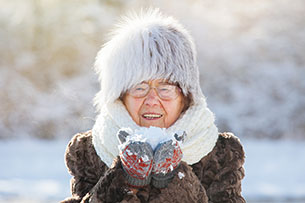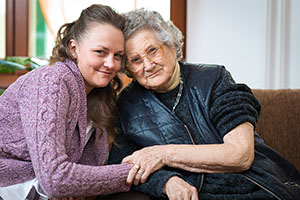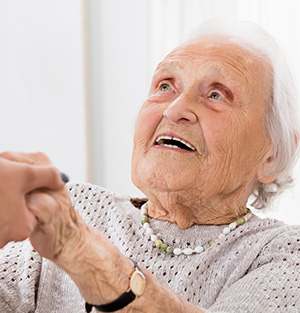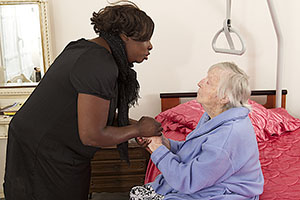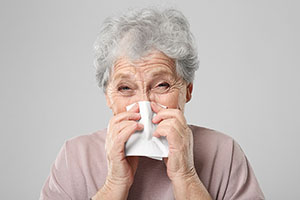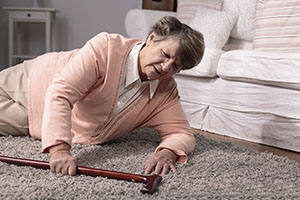Selling a home that has been lived in for many years can be a difficult process whether a loved one has passed or is just moving into a nursing home. Many memories have been made that hold a multitude of emotions and it is hard to let it all go. Here are a few steps to help ease the stress of preparing your loved one’s home for sale. Be Patient If time isn’t of the essence put a 60-90 day freeze on all decision making. During that time leave everything in the home as-is except for expiring food, medicines, and anything else that could leave a bad odor. This hold-over time period will give friends and family time to grieve, time to process the options, and time to remember the home exactly how it was while your loved one still lived there. Get Expert Help A lawyer should be one of your first calls as they can help get the necessary paperwork in order such as a power of attorney and will. They can also help you navigate through probate. Seeking legal advice about selling a home is always advised as it can greatly affect the title of the home. Next, a realtor will be able to talk about all of your options when it comes to selling. Since a realtor doesn’t have any emotional attachment to the house, they will be able to be matter of fact and tell you the current market value of the home. A realtor will also let you know which items should be updated to get the most money out of the house. Declutter It can be difficult to let things go, but a house must be de-personalized in order to sell for top dollar. If the process is too difficult or daunting to do on your own, you might consider hiring an estate sale company to host an estate sale. If this is the route you go, it is best to step away from the process and let the professionals do their job. If you prefer to go through items yourself, consider hiring an appraiser or specialist to look at antiques to find out their true value. Less valuable items can be donated so you know they are going to a good home. Non-profit businesses that are usually seeking donations include Goodwill, Salvation Army, and Habitat for Humanity Restores. Update/Repairs A lived-in home will have signs of wear & tear. At a minimum fix cracked tiles, patch holes in walls, give the home a coat of fresh neutral paint, replace burned out lightbulbs, and remove curtains to let the most light in. You might also consider installing new carpet and flooring. To get the most money out of the home, consider doing a kitchen and bathroom remodel as those spaces tend to be the biggest selling points of a house. If you don’t have time for a major renovation you can update simple items such as replacing light fixtures, faucets, and hinges. In the bathrooms add a few stacked washcloths tied with a ribbon, add lightly scented candles, and buy matching bathmats & towels in a light green, blue or white tone. Your realtor might also suggest hiring a professional stager, who will bring in contemporary furniture to enhance the homes attractiveness to potential buyers. Clean, Clean, Clean One of the last steps inside the home is to give it a good cleaning. If you don’t mind putting in the elbow grease, then begin with washing the windows, vacuuming, dusting, wiping down all surfaces, and polishing appliances. You can also consider hiring a cleaning company, who can come in and make the home sparkle in just a few hours. Curb Appeal Lastly, spruce up the landscaping and front entrance of the home which might have become neglected. Trim shrubs, add flowers, mow the lawn, give the front door a fresh coat of paint, and paint faded trim. In addition, certain buyer’s loan types such as FHA & VA will require rotted deck boards be replaced, that peeling paint is fixed, and any broken windows be repaired. If you are ready to take the next step in selling, call lMike Lies with Gold Compass Real Estate at 303-325-5690.
Make an Appoinment
Jennifer Moorehead | Elderlink Home Care - Part 13
As the winter months approach, the senior in your life may require some extra attention and steps to keep them safe and healthy. Cold temperatures, snow, and slick sidewalks all have an enormous impact on a senior’s overall well-being. Here are some things that you can do to do to help your senior get ready for the long cold winter months. Schedule physical/flu shot with medical provider Make an appointment for your loved one to visit with their health care provider. Make sure they get their annual flu shot during this visit and address any concerns you might have with the doctor. Pack up summer clothing Older adults are more prone to hypothermia, which is the result of too much heat escaping from the body. Seniors need to dress very warmly during colder months. Since some seniors have cognitive issues, it might be necessary to pack summer clothes away to keep seniors from making the mistake of wearing inappropriate clothing for the weather. Putting winter clothes out will reduce confusion in the senior and make their selection easier. Take necessary steps to winterize the home Check the home to make sure there are no places where heat can escape. Arrange to apply new caulking, sealants, or tarp to windows if needed. Be sure that weathering strips are around the doors to keep cold air out and electric bills down. It might be necessary to have someone come out and check a heating system if the senior heats the home with central heat. This is also a chance to make sure the gutters are cleaned out and remove any clogs. Change curtains at windows to heavier drapes Get rid of the summer curtains and put up heavier drapes at windows. Drapes will keep it warmer in the rooms, preventing heat from escaping through windows. Depending on how many rooms are used during the day, it might only be necessary to heat up a few rooms during the day. Heating up only the rooms used during the day or night will reduce the electric bill cost. Check fire alarms and carbon monoxide detectors Check all the batteries in fire alarms and carbon monoxide detectors. It is probably best to go ahead and change the batteries if you cannot remember the last time they have been replaced. The use of a fireplace, lantern, or gas heater can sometimes lead to exposure to carbon monoxide poisoning. Remember, people do not know when they are being exposed to carbon monoxide, it is colorless and odorless. Pack an emergency winter kit Pack an emergency winter survival kit for the senior. Everyone should have an emergency kit, just in case the power goes out overnight. The kit should include a flashlight, extra batteries, warm blanket, battery operated radio, and non-perishable foods and water. Do not forget to include a first aid kit as well. There should also be another first aid kit which is easily accessible in the home for minor accidents. Post emergency contacts Post emergency contacts for all those who will be helping care for your loved one. People helping care for them should know how to contact you at all times. Your elderly loved one should have numbers right at their fingertips if they should need to get in contact with someone right away. Are you considering home care for your loved one? Elderlink caregivers help with tasks of daily to ensure your loved one is able to remain in the comfort of their own home. To find out more about our services, contact us.
There comes a time in many seniors’ lives when it becomes necessary for them to receive home care in order to continue living in their home safely and independently. Some families and seniors can be reluctant to bring in care 24 hours a day, 7 days per week, as it is such a drastic change from living independently. When in-home care becomes a necessity not only to ensure your loved one’s safety, but to provide you with much needed and priceless peace of mind, there are several signs that indicate your loved one may need and benefit from 24-hour care. Sign #1: Aggression Dementia and Alzheimer’s can cause aggression in seniors who were once calm and peaceful. Unfortunately, aggression can cause significantly increased problems for caregivers and family members. As your loved one becomes increasingly aggressive, it’s necessary to provide a higher level of care. Considering home care during this difficult time can be a vital move for many families. Not only can a caregiver help calm your loved one down, they can provide them with the support they need to avoid potentially dangerous situations. A caregiver is also less likely to take your loved one’s aggression personally, which can make it easier for them to handle those interactions. Sign #2: Caregiver Stress Caring for a senior loved one can be incredibly stressful. While there are some levels of stress that are accepted as normal, there comes a point where it is time to ask for help. If caregiver stress is mounting to the point that it’s difficult for them to function or if they are no longer able to balance normal responsibilities with the needs associated with caring for their loved one, it may be time to consider home care. Sign #3: Safety Concerns Considering the safety of your loved one when they’re at home is one of the most important issues. Take a look around the house. Are there considerable hazards that could be dangerous for your loved one? Consider stairs, exposed cables, and whether or not they will be able to successfully navigate the home, among other factors. As your loved one’s condition deteriorates, they may wander or struggle to remember that they’re unable to go up the stairs the way they once did. A caregiver can help by offering an extra set of eyes and ears to make sure there is nothing dangerous in the home and take care of tasks that may have gotten more difficult or dangerous for your loved one to complete on their own. Sign #4: Therapies are Required When your loved one has been admitted to the hospital, whether for ongoing medical issues, for surgery, or for another reason, they may require therapy to help them move through the recovery process. They may also be struggling more than usual to take care of basic self-care tasks, to keep up with the house, or to find the motivation to get up and moving instead of sitting around on the couch. Having a caregiver during this difficult time is one way to help encourage your loved one and be sure that they’re getting the help they need. Sign #5: Caregiver Burnout Caregiver burnout is a state of mental, physical, and emotional exhaustion. Caregivers who have reached this point have moved beyond stress to a point that they are no longer able to take care of basic care tasks. They may feel as though they’re struggling through everyday activities or as though each day is more difficult than the last. When a caregiver reaches the point of burnout, it’s critical for both their health and the health of the senior that additional help be brought in. Elderlink Home Care is a surprisingly affordable way to be sure that your elderly loved one receives the care they need when the time comes to home care at any level. If you have a loved one who is in need of round-the-clock care or even one visit per week, contact us. We’re here to help maintain your loved one’s quality of life and make it easier for you to maintain yours at the same time.
As the holiday season begins, it’s important to consider how you want to celebrate with the special people in your life–including seniors who may have decreased mobility, in turn making attending celebrations challenging for them. Do you want more involvement with your senior loved one this year? Are you eager to celebrate the holiday with them, but not quite sure where to start? Try some of these great ideas to make the most your holiday with your senior loved one. Create Great Decorations It’s time for fall, and with the arrival of the season, there are plenty of great decorations that reflect the Thanksgiving holiday and the gorgeous weather outside. Consider the types of crafts and decorations that your senior loved one enjoys creating, whether it’s crocheting a custom set of placemats or putting together a stunning centerpiece. Look for ways that you can create those custom decorations together. Working together on fun crafts is a great bonding opportunity as well as something that will make your senior loved one feel like a useful and needed part of the holiday planning experience. This can be particularly useful if your loved one is used to hosting the holiday gathering, since it will allow them to continue to be active in the planning process. Plan the Perfect Thanksgiving Meal You’re putting together the perfect Thanksgiving meal for your entire family–but what does your elderly loved one consider to be the perfect Thanksgiving? Take the time to sit down with them before the holiday gathering. Ask them what they’d most like to eat. Do they love turkey, or do they prefer a slightly different tradition? Do they have favorite sides that they’d love to see on the Thanksgiving table? This is a great opportunity to share family recipes and bond in the kitchen, allowing you to see exactly how they make those special favorites from your younger years. When the day of the meal arrives, take the time to ask your elderly loved one exactly what they want on their plate so that they get the perfect Thanksgiving experience. Create Activities for Everyone When the food is all eaten and everyone is stuffed to the gills, what will you do with the rest of your Thanksgiving? Look for activities that everyone can participate in together. You could, for example: Play Turkey Bingo Construct a gratitude tree, with handprint leaves on which everyone shares what they’re thankful for Look through Black Friday ads together and make a plan for shopping, either out in the stores or online Play charades or another fun game with a Thanksgiving twist Take family pictures while everyone is gathered together Reflect on the Past How many opportunities do you have to bring your entire family together and reminisce about the past? This Thanksgiving, enjoy having your family all in one place and make a point to talk about pleasant holiday memories. Ask your senior loved one about their most memorable moments. Chances are, they’ll have some great stories! Even better, take the time to sit down and add stories to a scrapbook or photo album. Those will be cherished reminders of your entire family that you can enjoy for years to come. This Thanksgiving, make sure that you make the most of the season with your senior loved one. It’s time to pull out all the stops and take the time for some bonding and fun. Contact us to learn more about our in-home care options and how we can help increase your loved one’s quality of life.
If you’re experiencing caregiver guilt, you’re not alone. Caring for aging parents or loved ones often means less time for you and the things you enjoy doing. Balancing their needs with your work and family demands can leave little time for you. Caregiver guilt is very real and learning how to manage the guilt is important for your physical and emotional health and well-being. Here are 5 tips for coping with caregiver guilt: 1. Identify and Acknowledge Your Guilt Caring for an aging parent or loved one can creates feelings of guilt, anger, and resentment. You envy friends who are taking weekend trips and yet you feel guilty if you schedule one of your own. Ask yourself why you feel the way you do and acknowledge your guilt. Learn to deal with your feelings by talking them out with trusted friends and family. Additionally, try to let go of what you can’t control. While easier said than done, acknowledging that it is impossible to be all things to all people is an important first step to managing your guilt. 2. Focus on the Why While feelings of obligation drive us to help our loved ones, you must keep your eye on the bigger picture. Your situation might be stressful now, but your time with your loved one is limited. Acknowledge that you are doing the best job you can and that your sacrifices are affording you precious time with your loved one. 3. Avoid Comparisons Chances are, you will encounter other caregivers while taking on this role. Or, perhaps you have friends in similar situations. It is important to avoid comparing your skills and abilities with those of another caregiver. What you observe doesn’t necessarily portray the entire picture of what someone else is dealing with—for example, they may not have children to care for at home and perhaps they don’t need to work. Comparing yourself to other caregivers just creates additional stress and guilt you don’t need. 4. Communication is Key While caring for our aging parents or loved ones, we sometimes fail to communicate with them. Having them participate in decision making while they are still able to do so is important for both of you. Ask them for their opinions and to clarify their wishes. Even if you are not able to accommodate them, they will feel that they were heard and their wishes are important to you. Communicate daily, if possible, even if it’s a quick phone call. Keep them up-to-date with what’s going on in your own life so they feel included as a member of the family. 5. Ask for Help Be realistic about your abilities and limitations. A superhero approach is a surefire way to experience burnout and frustration. Your loved one deserves quality care and you deserve peace-of-mind. Don’t be afraid to ask for help. Reach out to extended family, friends, and neighbors and consider home care services from Elderlink. How Elderlink Can Help There’s no place like home! This is especially true for your aging parents or loved one. At Elderlink Home Care, Inc., we have been providing quality and trusted home care to Denver’s seniors for over 30 years. Our services provide the care your loved one needs and provides you with something priceless – peace of mind. Feelings of guilt and resentment are very common among family caregivers. Using your precious free time to run loved ones to appointments or for groceries leaves you with little time for yourself. In addition, your time spent with your loved one is rushed and often stressful. In-home care allows you better quality time with your loved one for simply enjoying each other’s company. For 30 years, Elderlink Home Care, Inc. has helped families in situations similar to yours. Let us help you by reaching out today. Contact us today to discuss your loved one’s needs and to learn more about our services.
Elderlink is very happy to announce the winner of our ‘Celebrating 30 Years’ grant for September, 2018 – Mr. Edwin Bubla! Mr. Bubla was born in St. Louis, Missouri and has called Colorado home for the past 30 years. When he was 18, he joined the Army then worked on the railroad as a signal maintainer, retiring after 32 years. Mr. Bubla and his late wife, Bernadine, were married for 47 years! His favorite place he’s ever visited is Italy, which he was able to see while stationed there in the Army. Ed loves football and the Broncos. When asked what he wanted to do with his $300 reward? “A new shaver and maybe a case of Budweiser!”. Good choice Mr. Bubla and again, congratulations to you!
Caregiving for an elderly client or loved one is an honor and a privilege, but it can also be incredibly difficult at times. In many cases, you’ll find yourself feeling overwhelmed or struggling with whether or not you’re going to be able to do enough in your life. Being prepared for those challenges and knowing what to expect can help you overcome them–or at least offer a little more perspective on what’s needed to care for the senior in your life. Problem #1: Being Overwhelmed with Chores Caring for an elderly loved one means taking care of a wide range of chores, including the day-to-day care around their home. Chances are, you’re already taking care of those tasks around your own home, which means that when you’re caring for an elderly loved one, the responsibilities are doubled. Those responsibilities can quickly become extremely overwhelming. Organization is key to maintaining your schedule. It’s also important to know when its time for some outside help. Problem #2: Financial Concerns You wouldn’t put a cost on caring for your aging parent for the world, but that doesn’t mean that it isn’t expensive. If your parent’s money is limited or they didn’t properly plan for retirement, all the family members may need to kick in to help provide care. Unfortunately, you may see financial stress from both sides: while you’re working hard to care for them, it can be hard for you to put in the hours you need at work, too. Problem #3: Feelings of Isolation If you are the primary caretaker for a loved one who needs daily care, you’re with them constantly–and that can quickly lead to social stress. You’re isolated from your friends, your social life, and even other family members. Its important to remember to make time for yourself and take care of your needs. Problem #4: Exhaustion In some cases, caregiving may require physical exertion. Not only that, you have increased responsibilities resting on your shoulders and little time to complete them all. With stress levels mounting, it’s little wonder that many caregivers report feelings of exhaustion that only grow as caregiving continues. Problem #5: Guilt “Mom guilt” is a familiar challenge for many women: they’re trying to give as much as they can to their families, but they’re also stretched in many different directions. Caregivers often experience similar guilt. You may feel guilty because you aren’t doing more, guilt for the things that you’re neglecting in order to provide care for your senior loved one, and even guilt for feeling resentful of the things you’ve been asked to do. Worse, you’re struggling to make enough time for your other family members and relationships, and may struggle with constant feelings of guilt. Caring for a senior loved one can be incredibly challenging. It’s not something you have to face alone! In-home care can make it much easier to ensure your loved one’s needs are being met – as well as your own. If you’re struggling to provide care for your senior loved one by yourself or if you need a break, contact us. We’ll work with you to ensure that your loved one is cared for, giving you the peace of mind you deserve.
Flu season is fast approaching, and with it, come a number of potential dangers for seniors. The flu is more dangerous for seniors than it may be for others: seniors account for more than half of hospitalizations for flu symptoms. Not only that, when seniors get the flu, they may face more severe health ramifications after the illness than an otherwise healthy adult. For months after, seniors may be at a higher risk for heart attack, stroke and other types of disabilities. This makes flu prevention important for everyone, particularly the senior community. These tips will help you and your elderly loved ones stay healthy this flu season. Step One: Get a Flu Vaccine Getting the flu shot is the most effective way to combat the flu. While the flu shot is not 100% effective in preventing all strains of the flu, it can greatly reduce the risk that you’ll end up sick–and even if you do get the flu, your symptoms may be less severe. In spite of the fact that their immune response decreases with age, seniors respond as well to the flu shot as other age groups, making this the critical first response in your battle to stay healthy this cold and flu season. Step Two: Wash and Sanitize Your Hands Regularly Viruses are everywhere. The most common way to pick them up, other than being in the presence of someone who is coughing or sneezing, is through your hands. Simply handling items in a store or using a doorknob can expose you to flu germs. Make a habit of washing and sanitizing your hands regularly, and avoid touching your eyes, nose, and mouth until your hands are washed and sanitized. Step Three: Build Your Immune System Your immune system is a complex system that depends greatly on your overall health. As you move into cold and flu season, look for ways to help boost your immune system. This might include: Eating plenty of healthy fruits and vegetables and decreasing sugar consumption Make sure you are getting enough sleep every night Exercise regularly: at least 30 minutes 5 times a week Take supplements that will help build your immune system. Elderberry and vitamin C are both great choices. Step Four: Maintain a Clean Environment Fighting the flu and other viruses requires constant vigilance. While you can’t keep your environment 100% clean, 100% of the time, you can take the time to wipe down surfaces and keep your home as clean as possible. Change air filters regularly, make sure to wipe down counters, and spend some extra time cleaning after you’ve had guests. Step Five: Take Precautions Avoiding crowded areas during cold and flu season can go a long way towards keeping you healthy. When that’s not possible, consider wearing a face mask, which can decrease your exposure to dangerous germs. Avoid people who are sick, even if it means turning down an invitation to spend time with family: your health is worth it! Step Six: Stay Hydrated Drinking plenty of water and staying hydrated is important when it comes to ensuring your immune system is functioning at the right level. Keep a water bottle with you and refill it often throughout the day. Make sure that you’re drinking plenty of water, not just soda or juice. Avoiding the flu this season can be a challenge, but it’s one that’s worth the effort. Do you or a loved one need assistance with everyday living activities? Elderlink Home Care is here to help. Contact us today to learn more about our services and how we can help!
Most seniors would prefer to live at home for as long as possible–and you like the idea of having your senior loved one in their home for as long as possible. Unfortunately, living at home can add several increased risks to what your loved one faces every day. If your loved one is still living at home, make sure that both of you fully understand the risks so if the time comes where additional in-home assistance is needed to ensure your loved one’s safety, you are well-prepared for the change. Risk #1: Isolation Many seniors find themselves living home alone after their spouse has passed away. This can leave them isolated from the outside world, especially if they don’t regularly go out with friends or if they’re no longer able to drive. Unfortunately, social isolation doesn’t just impact your mental health. It can also cause a decreased lifespan, a higher risk of heart ailments and an increased risk of physical issues as your loved one ages. Risk #2: Increased Risk of Injuries As seniors age, their risks of falling and other traumatic injuries rise along with them. Poor eyesight, limited mobility and safety hazards throughout the house can make it difficult to safely perform the daily tasks of living. Seniors who live alone are at increased risk of injury, since there’s no one to help take care of those important tasks for them. It’s also important to consider how injuries might be handled if there’s no one in the home to notice and your loved one is unable to call for help. Risk #3: Medications Many seniors discover that their memory is one of the first things to fail them. Sometimes, it’s as simple as walking into a room and forgetting why they’re there. Managing medications properly with poor memory can be an ongoing struggle and frankly, can be very dangerous. Seniors may forget whether or not they’ve taken their medications, leading to over- or under-dosing. This can lead to serious health complications, especially in seniors with significant medical conditions that require regular medication, monitoring and care. Risk #4: Becoming a Target Many scammers have learned that seniors living at home alone are an easier target for their scams. Seniors are more likely to give out financial information over the phone or to respond to a plea for help. Scammers may pretend to be a grandchild or other loved one in trouble in an effort to get seniors to give out personal information, which can then leave them suffering financially. Risk #5: Failing Health Due to Malnutrition Seniors who live at home alone run an increased risk for malnutrition. They may have poor diets, from struggling to remember whether or not they’ve eaten to choosing unhealthy sweets and other meals instead of healthier options. As appetite decreases or problems with chewing increase, seniors may opt to forego meals, which can in turn lead to malnutrition and other serious health problems. Risk #6: Higher Rates of Depression and Anxiety Seniors who live at home alone are at a higher risk to develop depression and anxiety. With too much time to think and not enough interaction with other people, it’s easy to become paranoid or to otherwise struggle with mental health. Depression and anxiety can in turn lead to very physical health problems. Do you have a senior loved one struggling to perform the tasks of daily living safely? Securing home care services can be a huge help and offer you priceless peace of mind. At Elderlink Home Care, we provide surprisingly affordable care for seniors who need assistance with the activities and tasks of daily living. If you or a loved in is in need of assistance, contact us today to learn more about the services we can provide.


